Chinese Emperors
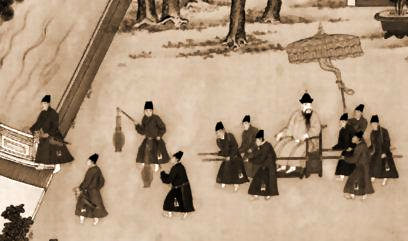
In sections describing the long history of China, the emperor is frequently mentioned without actually describing what he did as if emperors of all nations are the same. Here we look at the Imperial system in broad sweeping terms ignoring the many variations that occurred over thousands of years. Although China has been a republic for over one hundred years the role of Emperor is still evident in the style of President Xi Jinping's government.
The Emperor 皇帝 Huáng dì
Like so many Chinese concepts there is no accurate translation in western terms and concepts. Talk of empire immediately conjures up thoughts of the brutality of conquerors such as the Roman Emperors. At the other end of the spectrum there are constitutional monarchies as in Britain where the monarch has no power. The Chinese conception was always different, there has always been a ritualistic and religious aspect. Perhaps thinking of the Pope as the head of the Roman Catholic church has some merit as the emperor has some paternalistic duty of care over his people. The Chinese emperor should also lead an exemplary life of virtue to act as a guide for his subjects to follow. This expectation of duty led emperors to differentiate strongly between public and private life. In public they cultivated an air of mysticism, keeping themselves out of the public eye. Only a few emperors succumbed to the temptation of ruling as total autocrats - making decisions on their own and in their own interest. The role was always a peaceful and not a military one as shown by the emperor never wearing military uniform or carrying a weapon at official engagements.
Imperial Organization
Closest to the emperor was a large phalanx of eunuchs, usually numbered in thousands. They were his personal servants to carry out his wishes and maintain his welfare. Eunuchs controlled access to the emperor and often became very powerful political advisers. There was a strict hierarchy of eunuchs and only very few of them became rich and powerful, most remained menial servants.
Then there were the officials who were responsible for Imperial administration outside the palace (The 内务府 Nèi wù fǔ) . Throughout most of the last two thousand years these have been selected on scholastic merit not on personal patronage. The highest ranked officials (members of the Hanlin Academy) would be employed as tutors to the Imperial family. Although posts were not hereditary there were families that produced a long line of scholars who passed the Imperial examinations and became senior officials.
The Imperial family formed another important faction. Imperial patronage appointed them to positions at court. The princes were potential emperors in waiting and gathered sycophantic supporters, princes were appointed to posts (often as provincial governors in far flung provinces) to gather experience of rule and were judged by the emperor on their performance.
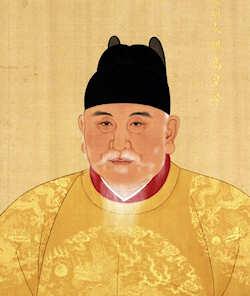
Son of Heaven : 天子 Tiān zǐ
Crucial to the Imperial system of China is the concept of ‘Son of Heaven’. It is a tricky term to translate as the Chinese ‘heaven’ is not the same as a Abrahamic ‘heaven’ perhaps ‘cosmos’ would be better. A more correct translation may be ‘rightful emperor’. The Chinese emperor was considered a descendent of 上帝 Shàng Dì the divine ruler. A family tree traces all the emperors back to the Yellow Emperor 黄帝 huáng dì (although the family tree has to take some rather bizarre turns to accommodate them all).
China for thousands of years considered herself the center of the world both culturally and geographically. The emperor was the sole conduit between the world of men and the cosmos. He made the law rather than some separate deity. The concept did not admit other rulers to be at the same level as himself, he was at the top of the power pyramid, not just of China but the whole world - there could never be two ‘Sons of Heaven’.
He performed the ancient, traditional rites to the heavens and he obeyed their demands just as a son obeys the father in Confucian doctrine. Should the emperor disobey heaven he loses the Mandate of Heaven and rebellion is to be expected and moreover justified. Chief among the rites were those honoring the ancestors. At the pinnacle of the Confucian power pyramid the emperor's veneration of his antecedents and heaven was paramount. He led annual ceremonies to all previous emperors. As the father figure of the nation he led the New Year festival at the Temple of Heaven and then set the agricultural year going by plowing three ritual furrows with a golden plow near the Temple of Agriculture each Spring. 200 farmers would be summoned to witness the act and various actors would represent the forces of the weather. The special variety of rice that was sown at this ritual was grown on to produce the grain offerings to be used at the harvest ritual. As the only link with the heavens these rites were held to be of the utmost importance. Any bad sign or deviation from ritual was thought to result in a ruinous harvest and mass starvation. China's geography has made it forever prone to floods and droughts. From early days people needed to collaborate to build flood defenses and buffer lakes to take floodwater. The emperor was considered responsible for the control of water and so should a flood ravage the country then it was some deficiency in his government that was blamed.
The emperor personally marked the finalist's papers in the Imperial examinations that would guarantee to their appointment as high officials. Some emperors neglected their Imperial duties and led lives of dissipation, but others set themselves grueling workloads. Emperor Yongle would receive his main audience with officials on the business of the day before dawn had broken. He would then spend much of the day reading and commenting on written reports. The first Qin Emperor measured his workload in the weight of documents processed.
Symbolically the Emperor was represented by the five clawed Imperial Dragon but don't forget that a dragon is powerful but benign in Chinese mythology, not evil.
Here is Somerset Maugham’s description of the Temple of Heaven ceremony from his book ‘On a Chinese Screen’:
“And hither, year after year, on the night of the winter solstice, for then heaven is reborn, generation after generation came the Son of Heaven solemnly to worship the original creator of his house. Escorted by princes and the great men of the realm, followed by his troops, the emperor purified by fasting proceeded to the altar. And here awaited him princes and ministers and mandarins, each in his allotted place, musicians and the dancers of the sacred dance. In the scanty light of the great torches the ceremonial robes were darkly splendid. And before the tablet on which were inscribed the words: Imperial Heaven-Supreme Emperor, he offered incense, jade, and silk, broth and rice spirit. He knelt and knocked his forehead against the marble pavement nine times. ”
Mandate of Heaven : 天命 Tiān mìng
The Emperor rules only so long as he has the support of ‘heaven’. The end of the mandate of heaven may be signaled by famines, floods, earthquakes, eclipses and other natural events. He can also lose the mandate by ruling despotically without concern for the people he both rules and serves. For more on this please see Mandate of Heaven section.
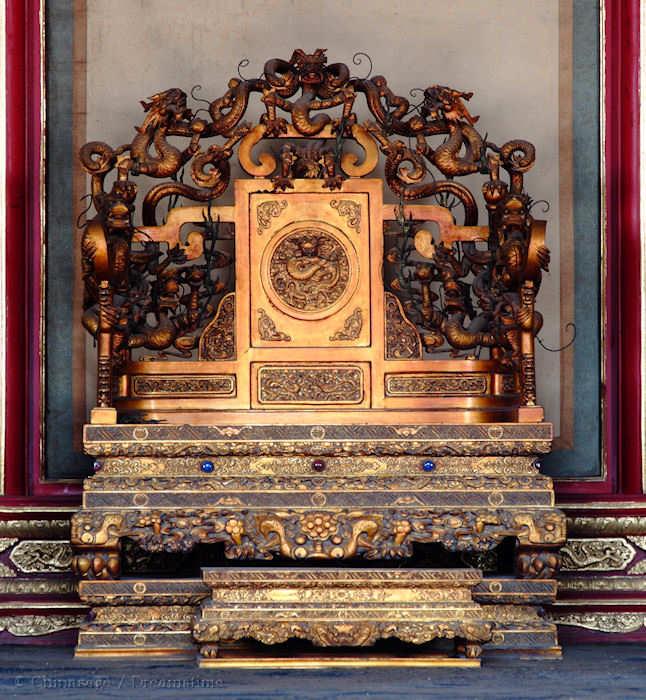
Imperial Titles
The normal greeting to the Chinese emperor was 皇上 Huáng shang roughly meaning ‘Imperial majesty’. In his absence the emperor was often referred to as 万岁爷 Wàn suì yé ‘Lord for countless years’ particularly by his eunuchs. His official title was 天子 Tiān zǐ ‘Son of Heaven’ . On the other-hand the Emperor would refer to himself with the pronoun 朕 Zhèn or when addressing an audience as 寡人 Guǎ rén ‘morally lacking person’ in a gesture of humility.
Imperial Names
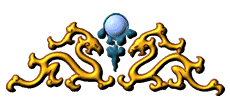
The names of Chinese emperors is a common cause of confusion because an emperor had several of them.
In Europe the tradition is to stick with the same name throughout your life, not so in China. Ordinary people as well as the Imperial family often changed their name. An important event in life was a typical reason for the change. A relatively recent example is former leader Hua Guofeng who was born as Su Zhu, he took the name Hua Guofeng short for ‘Chinese Anti-Japanese Aggression National Salvation Vanguard’ to protest his resistance to the Japanese Occupation. The Republican leader Sun Yatsen went by many names ➚ during his life and is known in China chiefly by the name Sun Zhongshan. Poets and artists had a literary name (a sort of nom de plume) as well as a given name.
However the situation for Imperial names is more complex. The unchanging bedrock was an emperor's family and given name 姓 xìng. In the case of the great Tang dynasty Emperor Taizong, he was born Li Shimin (李世民 Lǐ Shì mín). ‘Li’ is the family name of all the Tang Emperors, his forename was ‘Shimin’ (given name 名号 míng hào). On accession to the Imperial throne he took the reign name of 贞观 Zhēnguān. The reign name (年号 nián hào) is a title for a period of time not a personal name. Years were recorded by the year number within a reign, so 丙寅 唐贞观 would be the 13th year of the Tang Zhenguan period of Emperor Taizong's reign (627CE+13 = 640CE). [Note that the year uses the special 60 year character form for the numbers.] Especially in the Han dynasty the reign name was changed every few years to mark a particular event or campaign. Later on, in the Ming and Qing dynasties, emperors kept to a single reign name.
In the Qing dynasty a convention was adopted that all children of the same generation (brothers, cousins, second cousins etc.) would receive the same first part of the name. So Puyi 溥仪 had a brother Pujie 溥杰 half-brother Puren 溥任 while Puyi's father Zaifeng 载沣 had brothers Zaitao 载云 and Zaichun 载沣 (The emperor Tongzhi 同治). This allowed the strict Confucian rules on seniority of generations to be easily determined. The formal Qing dynastic family name was 爱新觉罗 Ai xīn jué luó
As well as reign names an Emperor was given a temple name 庙号 miào hào on his death. This name would posthumously proclaim the Emperor's achievements, and for Li Shimin the name chosen was 太宗 Tài zōng (meaning great clan or purpose or supreme ancestor) which in his case is the name by which he is best known. It should also be warned that old history books use other romanizations for his name, in Wade Giles his name is spelled T'ai-tsung. An honorific or descriptive name was also available after death, this name is known as the 谥号 shì hào.
Auspicious names were re-used over the centuries, perhaps chosen to bring an echo of a glorious reign long ago, so there is an Emperor Taizong of the Song as well as the Tang dynasties. There were five emperors who all chose the name Wudi to bask in the achievements of the great Han Emperor Wudi.
With so many names to choose from, it is not surprising that there is no simple rule for referring to emperors. For Mongol emperor Kublai Khan we use his given name; for Qing Emperor Qianlong his reign name while for Tang Emperor Taizong we use his temple name.
Empress and concubines
Contrary to popular belief there was only one empress, but the emperor would also have many concubines, often hundreds if not thousands. This system ensured there were plenty of sons for the emperor to choose from as his successor. If the empress bore him sons they were the most likely candidates to succeed him, but in the early times of widespread fatal disease and misadventure the continuation of the dynasty needed many more sons just in case. A son born to a concubine received the same status as the empress's sons. In 1900 the emperor is said to have had 150 concubines, but the emperor had to visit the empress and bow to her once every five days.
The Confucian doctrine of due deference to the family hierarchy requires that a person is always junior to his parents and must obey them in all things. This made the Dowager Empress (the mother of the emperor even if a concubine) immensely powerful, particularly for emperors in their youth who must obey their every wish. Daughters could never succeed as 'female emperor' even if there wer no sons, but there is one example that broke this rule to rule in her own right and that was the extraordinary Tang Empress Wu Zetian.
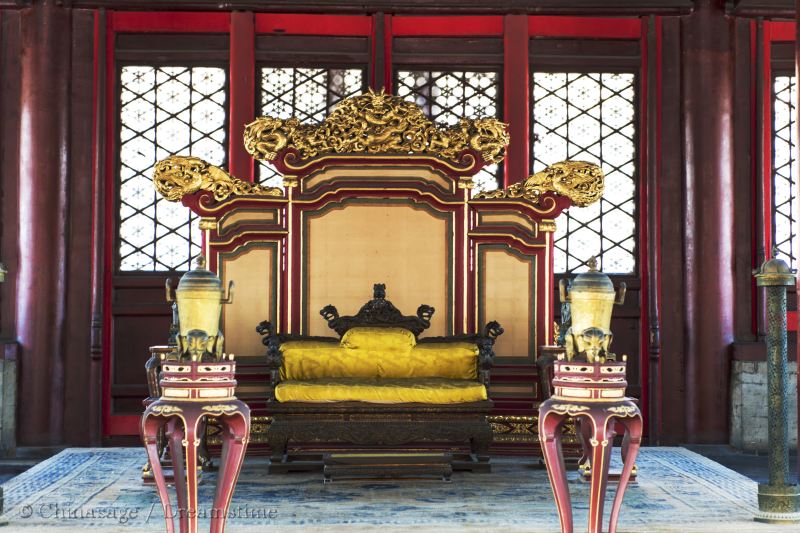
Imperial succession
A Chinese Emperor could not be succeeded by an uncle, this rule helped save China from turmoil as the emperor often had dozens of brothers. He would not usually be succeeded by a brother, but there have been notable exceptions. The rule was that a son, or failing that a nephew must succeed him - from the next generation. When a nephew was chosen his father was effectively sidelined and was subject to his son's rule. This created great difficulties particularly at the end of the Qing dynasty when a series of emperors died young. The choice of successor was in the Qing dynasty kept secret. The emperor would write down his choice and this would only be revealed on his death.
Benign dictatorship
It was Plato who wrote that Socrates believed the ideal form of government is not democracy but benign dictatorship under a Philosopher King ➚. The leader rules absolutely but only in the best interests of the people. The ruler ➚ surrounds himself with wise advisers and chooses the best policy. He can make strategic decisions for the long-term without worrying about short-term unpopularity. This was the system that the Jesuits believed that they had found when they arrived in China in the early 17th century. Great European thinkers such as Leibniz heard these reports and embraced the Chinese system of government as the most enlightened in the world.
However, the weakness of this system is that should an emperor turn to the bad he is much harder to remove from office than in a democracy, it usually took a long, bloody rebellion to end his rule.
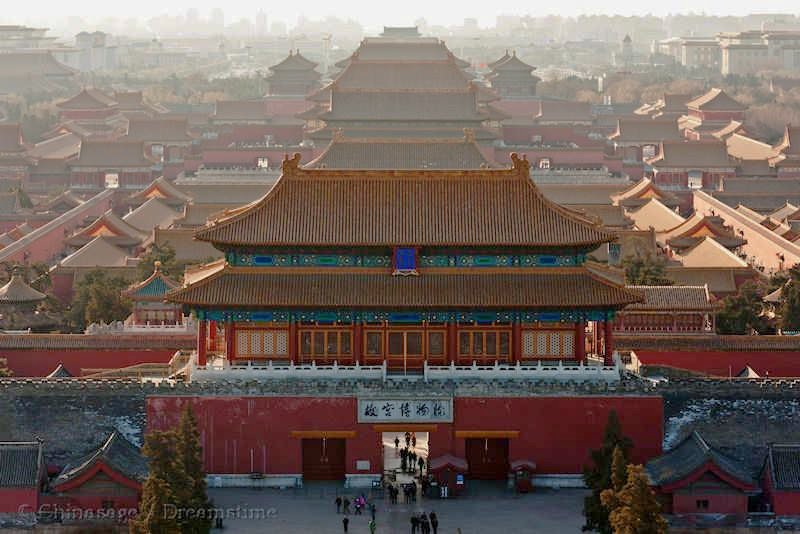
Centralized rule in China
A key feature of the Chinese model of empire is for a heavily centralized state with very limited local autonomy. The Imperial center made all the appointments even to a very local level and administered nearly all the finances. Administrative posts were held for short fixed terms and performance monitored. Imperial edicts written in the emperor's own hand received utmost priority. Each Imperial edict ended with the portentious statement ‘Tremble and Obey’.
Rapid communication
To support the centralized administration, fast communication to all points in the empire was needed. Horses were held in readiness at relay stations so that an Imperial edict could travel over 100 miles [161 kms] each day (in 1728 a message traveled 850 miles [1,368 kms] in just a week. Roads are not always the best way to travel, boats, camels and donkeys provided Imperial transport in more challenging terrains. To keep the system efficient letters were often sent in batches, only the most important ones went straight away. Strict rules required meticulous maintenance of roads to provide this rapid communication and no-one else could use them. Elsewhere in the world mail delivery was measured in weeks and months not days. The government could then react quickly to events in remote regions of China. The turmoil and conflict that was prevalent when provinces broke away has led to a strong correlation in the Chinese mind between central control and prosperity. This legacy of dynastic times is important in understanding China today as a rigid central system of control is maintained.
Rarely did the Chinese emperor emerge from his Imperial Palace and when he did the roads were cleared of all spectators as it was not considered proper for his subjects to so much as glance at the emperor.
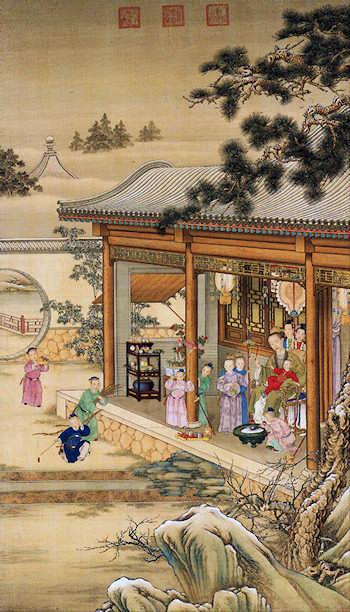
Censors in China
From the early years of Chinese history it was realized that without checks and balances corruption would take hold and bring ruin. One approach was to appoint administrators who lived far away and for a fixed term of office. The official could not then build up a local network of corrupt contacts and appoint his own family to posts. The second and more powerful mechanism was a branch of government to oversee administration. They would check that officials were performing their duties correctly. There 'censors' were not permanent positions, it was usual for a high official would serve for a limited term as a censor and then move on to other duties. Censors had complete freedom of speech and could even criticize the emperor (but often at some peril).
Just as important was the ability for an official to write to the Chinese Emperor suggesting a new policy or criticizing a current one. A senior official had the right to write directly, for the Emperor's eyes only so no official could block communication. These are unfortunately translated in English as ‘memorials’ 章表 zhāng biǎo while ‘letter’ or ‘essay’ would be more appropriate. These essays were often policy proposals and may result in the loss of their job if an emperor was sensitive to the criticism, but on the other hand the essay may lead to an opportunity to lead the implementation of a new policy. The Emperor noted his comments in vermillion (red) ink (only permitted for the Emperor) and space was allowed within the letter for his comments and a long blank space at the end for overall comments. Sometimes he would just annotate with 'Noted' but sometimes he would write a copious response. An urgent reply was covered in yellow cloth. If the Emperor wished to send letters to several trusted advisors and administrators these were in the form of court letters for which special protocols existed.
This mode of administration allows talented officials to quickly rise to power and influence, the life of the Commissioner Lin Zexu is a good example of this.
Tang Emperor Taizong explained the importance of the system in a note to his sons:
“The emperor, living in his palace, is blocked from direct access to information. For fear that faults might be left untold or defects unattended, he must set up various devices to elicit loyal suggestions and listen attentively to sincere advice...” (Chinese Civilization - A source book pp.113-144).
The Dynastic cycle
Important throughout Chinese history has been a repeated cycle of events that has marked out many a dynasty's rise and decline.
- Foundation of the new dynasty by military might.
- Period of wide ranging reforms under the new emperor.
- When the first emperor of the dynasty dies there is usually a conflict for succession amongst his sons.
- Long period of consolidation with increased prosperity.
- Gradual erosion of vitality through powerful vested interests (eunuchs, officials and empresses).
- Internal division and diminution of Imperial power.
- Decline and fall of the dynasty by rebellion.
Chinese scholars such as Kang Youwei considered this cycle as that of yang (male, dominant, fierce) naturally flowing to yin (female, passive, contemplative) over the centuries. Generalizations like this do not fit all dynasties. In two noted cases the Qin and Sui dynasties were both short-lived ‘one man dynasties’ where a new family took the throne after the death of the reforming vigor had died with the founder. The succeeding dynasties, Han and Tang respectively, retained many of the reforms of their predecessors.
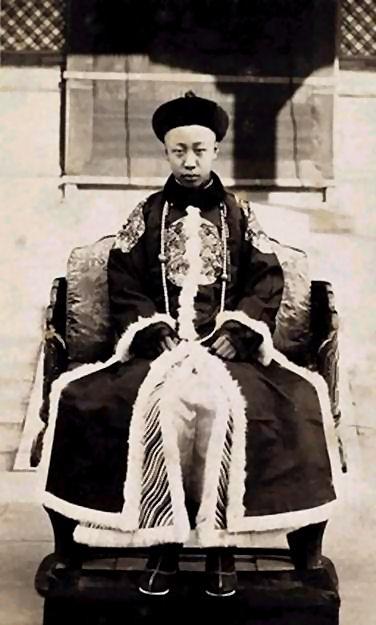
End of Empire
Puyi as the Emperor Xuantong (宣统帝) was the last emperor of China. He was emperor from the age of two in 1908 until he was forced out of the Forbidden City in 1924. From 1911 until 1924 the Republic of China allowed the emperor to continue in title only with no power to rule the country. For all about his fascinating life read the Last Emperor section.
President as Emperor
When the Republic of China was founded in 1911 the long Imperial tradition was not easily shaken off. The ‘Republican’ leader Yuan Shikai went on to attempt to form a new dynasty in the early days of the Republic in 1916. It is easy to see that Mao Zedong fits the bill as a dynastic founder - he overthrew his predecessors and brought in wide ranging reforms. What is more there was turmoil after his death on the question of a political successor.
In many ways the Imperial system lives on in China, and shows no signs of going away. There is general deference to the government and to the President in particular. He is still seen as working in China's best interests and as the nation's father figure. He governs by listening to advice from experts and then autocratically imposing it. China is unified and centrally controlled with surprisingly little variation among the 1,404 million inhabitants. There is a general feeling of solidarity between all the people as one big family with the President at its head. Criticism of the President is seen as deeply unpatriotic. Much has changed since the time of emperors but the relationships have remained the same.
Since the foundation of the PRC in 1949, the chairmen and presidents of China have retained an Imperial aura. They are not elected by the people and act in much the same way that an idealized emperor should have ruled: benignly to further the best interests of the people. All presidents have to belong to one clan: the Communist Party and are loyal to clan members just as in a dynasty.
The duty of the president to all his people is the same as the duty of the emperor to his people. This is why the Imperial analogy is still appropriate today and one reason why democratic elections for president are most unlikely. Rather than being chosen by accident of birth a president is chosen by his senior colleagues just as high officials would advise the emperor on the wisest choice of heir.